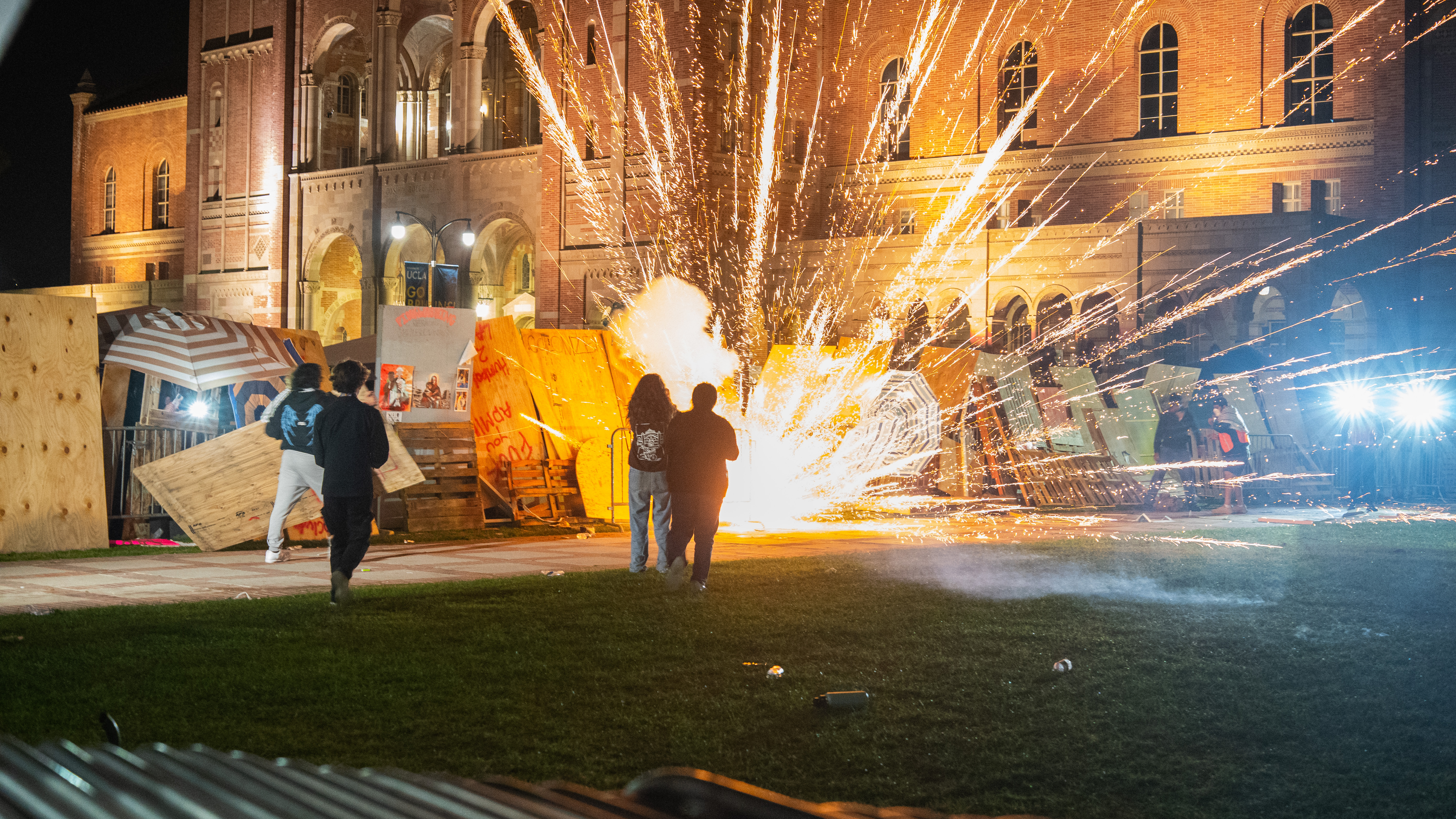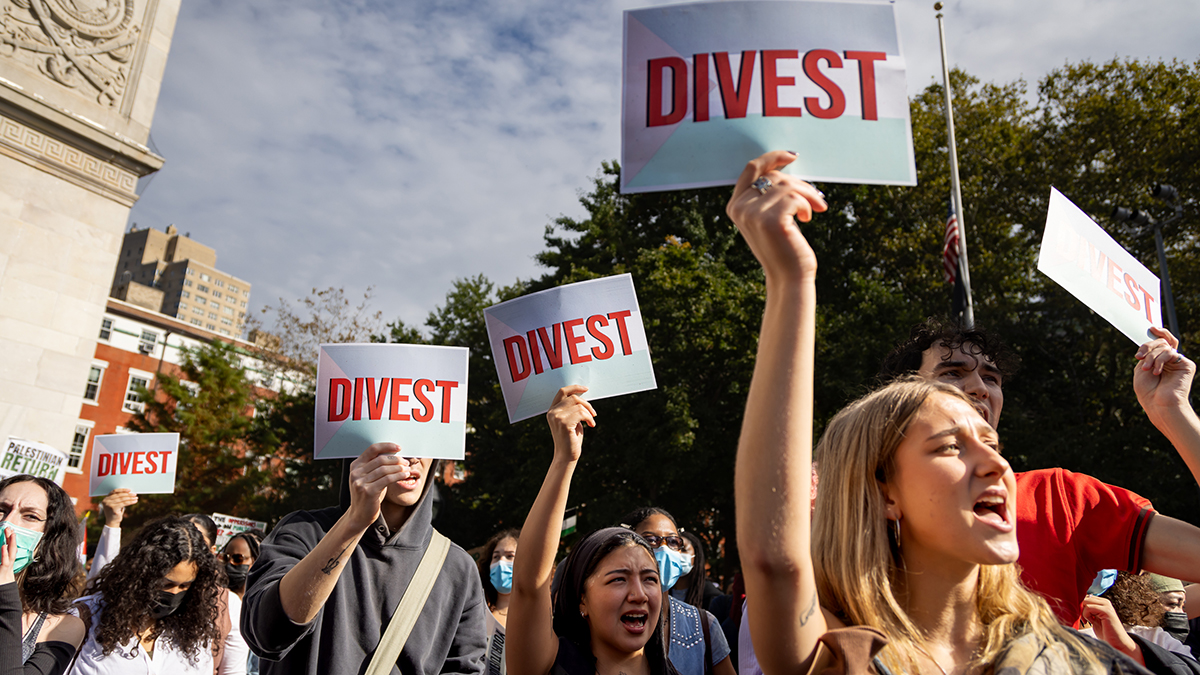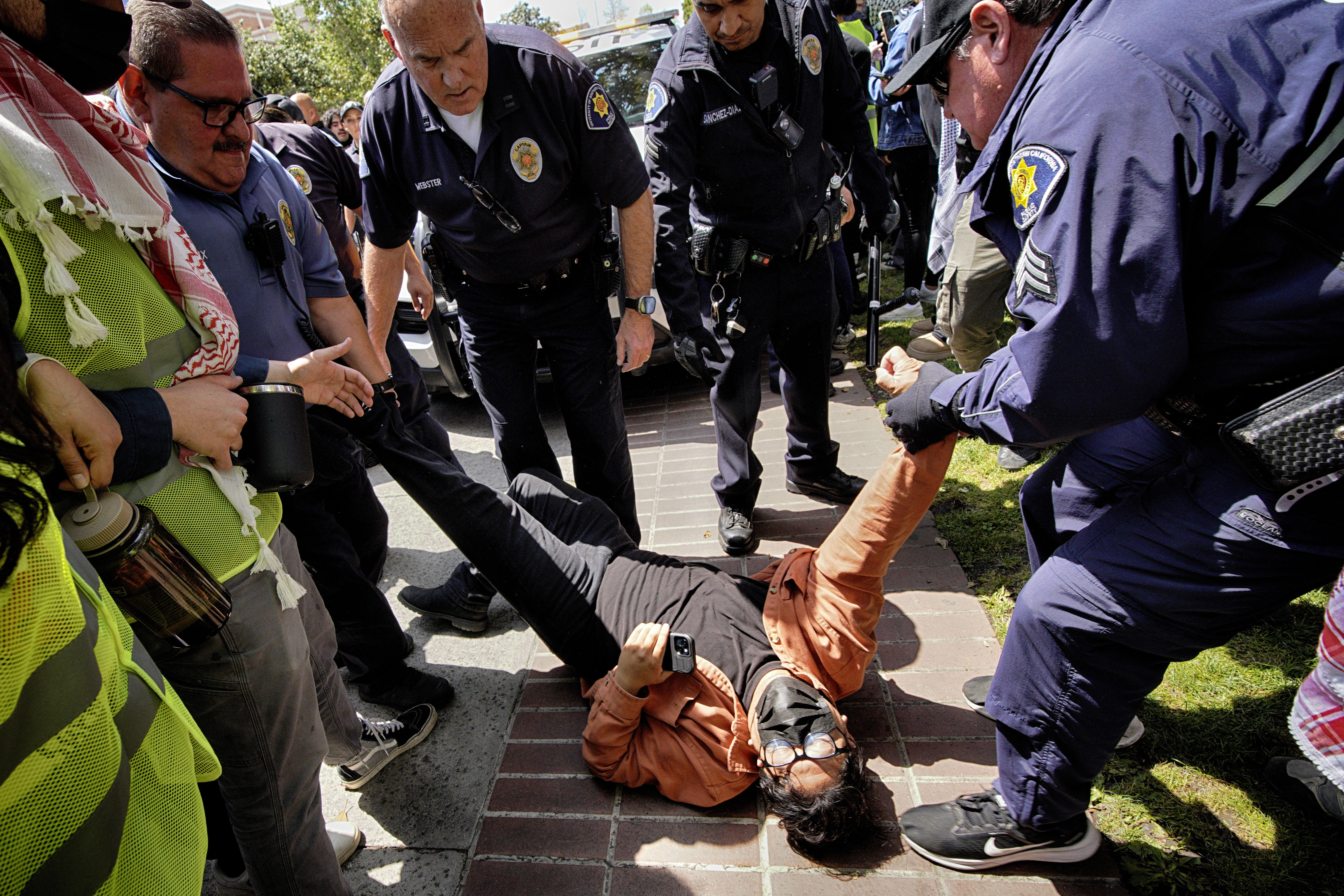Negotiations between Columbia University officials and protesters who have set up a pro-Palestinian encampment on a campus lawn have broken down, the school's president announced Monday.
Columbia University's president, Minouche Shafik, sent a letter to the school community Monday morning announcing talks had ended without an agreement.
"To that end, since Wednesday, a small group of academic leaders has been in constructive dialogue with student organizers to find a path that would result in the dismantling of the encampment and adherence to University policies going forward," Shafik said. "Regretfully, we were not able to come to an agreement." (Read the full letter below)
Students were asked to comply with Columbia's rules about when and where protests could take place, while continuing to press the university to divest from Israel.
Shafik said the university offered a number of steps including more transparency and review for future investing proposals, but said, "the University will not divest from Israel." The university also said it would invest in health and education in Gaza.
Without an agreement on removal of the encampment, Shafik urged protesters there to "voluntarily disperse." Shafik also said the university is talking with a "broader group" in the community to look at "alternative internal options" to end the encampment, but did not elaborate further on who is in that consultation group or what the dispersal options might look like.
Get Tri-state area news and weather forecasts to your inbox. Sign up for NBC New York newsletters.
School asks protesters to voluntarily leave encampment by 2 p.m. Monday or risk suspension in new notice
The university delivered a notice to protesters at the encampment to voluntarily leave by 2 p.m. on Monday or risk suspension from the school.
Despite that threat, protesters remained out in force on campus, bolstered by estimates of a thousand additional students who created a perimeter around the encampment leading up to the afternoon deadline.
“These repulsive scare tactics mean nothing compared to the deaths of over 34,000 Palestinians," one student protester said at an afternoon press conference. "We will not move until Columbia meets our demands or we are moved by force."
A cohort of faculty members adorned in bright orange vests assembled together outside the encampment to form a human wall.
"It didn't have to be this way. When the university brought in police only 24 hours after the encampment, they turned this university into a flashpoint and spectacle," professor Joseph Howley said.
The university's 2 p.m. notice came with instructions for students to identify themselves to a university official and sign a form committing to abide by school policies through June 30, 2025 or by graduation, whichever is sooner. For students who leave and sign the document, they will not be placed on suspension, according to the notice obtained by NBC News.
"We very much hope that you will leave the encampment and sign the form on your departure," the notice from Columbia University said.
Administration officials held their own press conference, virtually, at 5 p.m. where it was announced that suspensions had begun for students -- the exact number was unknown.
"The encampment has created an unwelcoming environment for many of our Jewish students and faculty and a noisy distraction that interferes with the teaching, learning and preparing for our final exams," Ben Chang, vice president for communications, told reporters.
Students under suspension will not be able to access the school's facilities and their ID will be deactivated, the notice said. Suspended students will not be able to complete the spring 2024 semester and can't participate in classes. The school said further sanctions for students who do not leave could include suspension for a term or more, and expulsion.
Monday is the final day of classes for the spring term and graduation is looming. On campus, an NBC New York crew saw students, faculty and staff being directed to specific security entrances along the campus and asked to show their school identification.
Commencement is scheduled to take place on Wednesday, May 15. Some other colleges have made changes to their commencement programs amid growing protests, including at USC, where the school cancelled its main commencement, though Columbia has not announced any changes at this point. Some of the ceremonies at Columbia are planned for the lawn where the encampment is currently located.
"We owe it to all of our graduates and their loved ones to honor their achievement," Shafik said. "We want to reassure our community who are trying to make plans that we will indeed hold a Commencement."
We want to reassure our community who are trying to make plans that we will indeed hold a Commencement.
Columbia University president, Minouche Shafik
Shafik said now that talks have broken down, protests can continue on campus but application only, with two days notice, and only in authorized locations.
In a letter to students over the weekend, the school said bringing back police “at this time” would be counterproductive following a large police response earlier this month when more than 100 protesters were arrested.
Speaking on "Morning Joe" Monday morning, New York Mayor Eric Adams said his administration has been communicating with presidents of local colleges, not just Columbia, but also New York University and the Fashion Institute of Technology.
"Columbia [is] not asking for assistance and other schools not asking for assistance, that's with an asterisk," Adams said on MSNBC. "They do want assistance of the Police Department. They would like for us to be on the outside. They would like for us to be at the entry points where they're finding a large number of people who are on the grounds, don't attend the schools at all. I've been saying this for a while. There's a lot of outside agitators.
"Our goal is to make sure that the students who want to attend school can get there safely and make sure that we don't allow those who are outside on the grounds or on the ground doing anything that's going to bring about danger."
Full statement from president of Columbia University
"Dear fellow members of the Columbia community,
Our University is committed to four core principles, which underpin all of our work and our shared values as a community:
First, we must keep all members of our community physically safe on campus.
Second, we are committed to academic freedom and to ensuring that all members of our community have the right to speak their minds.
Third, just as everyone at Columbia has the right to express their views, they also must respect the rights of others to do the same. As a result, protests must comply with time, place, and manner restrictions which, for example, prevent loud protests at night when other students are trying to sleep or prepare for exams. One group’s rights to express their views cannot come at the expense of another group’s right to speak, teach, and learn.
Fourth, our values—as well as our duties under civil rights laws—compel us to condemn hate and to protect every member of our community from harassment and discrimination. Antisemitic language and actions are unacceptable and calls for violence are simply abhorrent.
I know that many of our Jewish students, and other students as well, have found the atmosphere intolerable in recent weeks. Many have left campus, and that is a tragedy. To those students and their families, I want to say to you clearly: You are a valued part of the Columbia community. This is your campus too. We are committed to making Columbia safe for everyone, and to ensuring that you feel welcome and valued.
We've worked hard to balance these principles. To that end, since Wednesday, a small group of academic leaders has been in constructive dialogue with student organizers to find a path that would result in the dismantling of the encampment and adherence to University policies going forward. Regretfully, we were not able to come to an agreement.
Both sides in these discussions put forward robust and thoughtful offers and worked in good faith to reach common ground. We thank them all for their diligent work, long hours, and careful effort and wish they had reached a different outcome.
The University’s goal for the talks was a collaborative resolution with the protestors that would result in the orderly removal of the encampment from the lawn. The students also were asked to commit going forward to following the University’s rules, including those on the time, place, and manner for demonstrations and events.
While the University will not divest from Israel, the University offered to develop an expedited timeline for review of new proposals from the students by the Advisory Committee for Socially Responsible Investing, the body that considers divestment matters. The University also offered to publish a process for students to access a list of Columbia’s direct investment holdings, and to increase the frequency of updates to that list of holdings.
Additionally, the University offered to convene a faculty committee to address academic freedom and to begin a discussion on access and financial barriers to academic programs and global centers. The University also offered to make investments in health and education in Gaza, including supporting early childhood development and support for displaced scholars. There are important ideas that emerged from this dialogue, and we plan to explore pursuing them in the future.
As the past seven months have shown, our campus is roiled by divisions over the war in Gaza. All year, we have sought to facilitate opportunities for our students and faculty to engage in constructive dialogue, and we have provided ample space for protests and vigils to take place peacefully and without disruptions to academic life.
But we must take into account the rights of all members of our community. The encampment has created an unwelcoming environment for many of our Jewish students and faculty. External actors have contributed to creating a hostile environment in violation of Title VI, especially around our gates, that is unsafe for everyone—including our neighbors. With classes now concluding, it represents a noisy distraction for our students studying for exams and for everyone trying to complete the academic year.
Consistent with our interim demonstration policies, after reading days, exams, and Commencement, protests may continue on campus by application with two-days’ notice in authorized locations. We have no intention of suppressing speech or the right to peaceful protest.
We also do not want to deprive thousands of students and their families and friends of a graduation celebration. Please recall that many in this graduating class did not get a celebration when graduating from high school because of the pandemic, and many of them are the first in their families to earn a University degree. We owe it to all of our graduates and their loved ones to honor their achievement. We want to reassure our community who are trying to make plans that we will indeed hold a Commencement.
For all of the reasons above, we urge those in the encampment to voluntarily disperse. We are consulting with a broader group in our community to explore alternative internal options to end this crisis as soon as possible. We will continue to update the community with new developments.
Sincerely,
Minouche Shafik
President, Columbia University in the City of New York"




